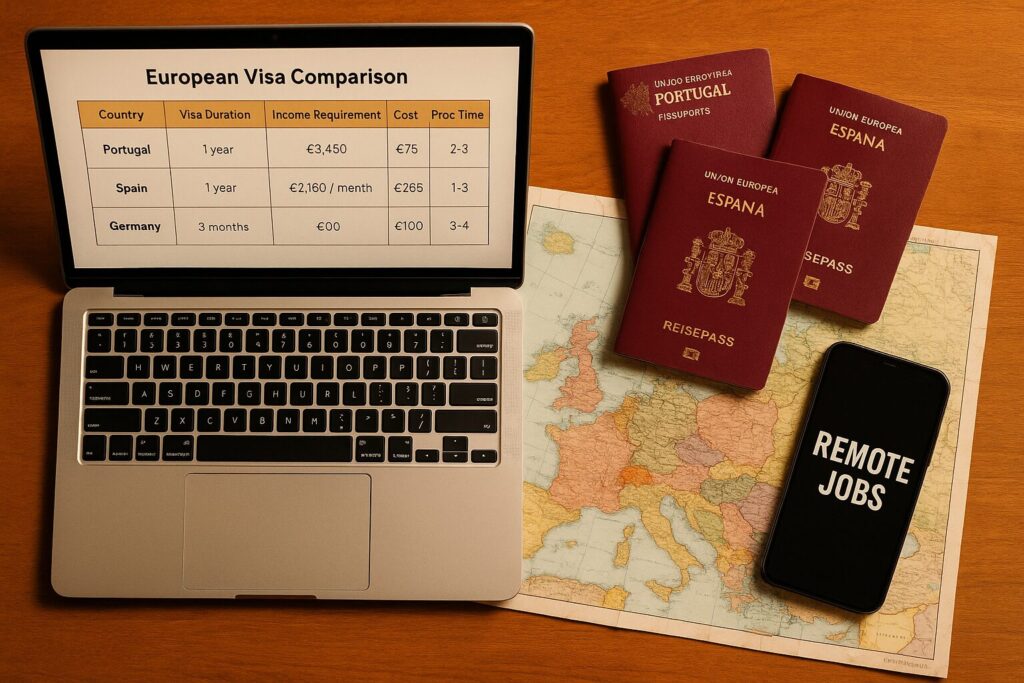
Introduction: Why Europe Is Welcoming Remote Workers with Open Arms
Let’s be honest — Europe has always been a dream for travelers. But in 2025? It’s turning into a paradise for digital nomads too.
With remote work becoming the norm (and not just a pandemic phase), many European countries are realizing: why not invite global professionals who bring income, spend locally, and stay longer than a quick vacation?
The result? A wave of new and improved digital nomad visas in europe 2025 programs — making it easier than ever to live, work, and explore some of the world’s most beautiful and culturally rich countries.
If you’ve ever thought about sipping espresso in Lisbon between Zoom calls or finishing a project from a beachside café in Croatia — this guide’s for you.
Top European Countries Offering Digital Nomad Visas in 2025
Not every country in Europe is on board (yet), but these ones are leading the pack with real, remote-worker-friendly visas:
🇵🇹 Portugal
Portugal’s D7 and Digital Nomad visas are a favorite. Low income requirements, coastal cities, and a laid-back vibe make it a top pick for freelancers and remote workers alike.
🇪🇸 Spain
Spain’s digital nomad visa finally launched — and it’s worth the hype. Sunny cities, strong expat networks, and big lifestyle perks. (Just be ready for some paperwork.)
🇪🇪 Estonia
Estonia was the first country to launch an official digital nomad visa — way back in 2020. Their e-Residency and modern systems still make it a solid choice for tech-savvy nomads.
🇭🇷 Croatia
Croatia’s visa is ideal for nature lovers and island hoppers. Beautiful scenery, affordable living, and a government that genuinely wants digital nomads.
🇬🇷 Greece
Sunshine, history, and now — a tax-friendly visa for remote workers. Greece offers discounts on income tax for newcomers, which makes it more than just a postcard-perfect option.
🇩🇪 Germany
While not a “nomad visa” in name, Germany’s Freelance Visa is excellent for creatives, writers, and consultants who can navigate the paperwork (especially in Berlin).
🇨🇿 Czech Republic
The Zivno visa is for freelancers working with Czech-based clients. A bit more bureaucratic, but still a solid way to stay long-term in central Europe.

Digital Nomad Visa Comparison (2025)
| Country | Minimum Income (USD/month) | Visa Duration | Renewable? | Application Time |
| Portugal | $3,000 | 1 year | Yes | 2–3 months |
| Spain | $2,500 | 1 year | Yes | 1–3 months |
| Estonia | $3,500 | 1 year | No | 30–60 days |
| Croatia | $2,300 | Up to 1 year | No | ~1 month |
| Greece | $3,700 | 1 year | Yes | ~1 month |
| Germany | N/A (varies by city) | 1–3 years | Yes | 2–4 months |
| Czech Rep. | ~$2,200 | 1 year | Yes | ~2–3 months |

How Do You Even Pick a Country?
Let me tell you — picking where to live in Europe isn’t as easy as opening a map and pointing. I thought it would be, but then I ended up in a €1,500 studio in Berlin wondering if I’d made a huge mistake.
Here’s what I wish I had known earlier:
- It’s not just about cost of living — it’s about cost of your living.
Sure, Lisbon is “affordable” on paper, but not if you like brunch every weekend and coworking memberships. Add it up honestly. - The weather? Huge deal.
Don’t pretend you can “push through” six months of gray skies if sunshine makes you happy. Seasonal blues are real. Ask anyone who’s tried to work through a Baltic winter. - What do you need to feel good?
Fast Wi-Fi? Community events? 24/7 supermarkets? Coworking within walking distance? Make a list. Your version of “ideal” isn’t the same as mine, or the girl on TikTok. - Trial and error is part of it.
Pick a place. Stay 30 days. Move on if it’s not it. You’re not buying a house — you’re just passing through. That freedom? That’s your biggest asset.
So yeah. Don’t overthink it. But also… think enough that you’re not stuck in a place where you spend all day indoors, Googling flights to somewhere else.

Real Cities Where Nomads Actually Live
These aren’t just SEO favorites. These are cities I’ve lived in, cried in, fallen in love with (and sometimes out of), worked 10-hour days in — and where digital nomads actually are in 2025.
🇵🇹 Lisbon
Lisbon is like that ex you keep going back to. It’s familiar, warm (mostly), and full of good coffee. Great food, loads of nomads, solid internet. Warning: rent’s gone up, but hey — that pastel de nata is still €1.20.
🇭🇺 Budapest
Big creative energy. Ruin bars, riverside coworking, and you can live pretty well without draining your bank account. Feels a bit rough around the edges in the best way possible.
🇬🇪 Tbilisi
You think you’ll stay a week. Suddenly it’s three months. The food is incredible, people are kind, and you don’t need a visa for a whole year. Internet’s solid. Rent is low. It’s got that magic you can’t explain.
🇭🇷 Split
If you need sun and the sea to function, this is the spot. You can literally jump in the Adriatic before a Zoom call. Bit touristy in summer, but peaceful in the shoulder seasons.
🇬🇷 Athens
You’ll either fall in love with the chaos… or run from it. But if you stay? Great food, gritty charm, low-ish rent, and a vibe that says, “you’re alive.” It’s not perfect — but maybe that’s why it works.
🇪🇪 Tallinn
Super digital, super chill. Cold AF in winter but efficient. If you’re building something or love peace and clean sidewalks, it’s a quiet win. Plus, the e-residency thing? Very nomad-friendly.
So… don’t let blogs or Instagram reels pick your city. Try a few. Stay long enough to know where the corner store is. Then decide.
That’s what this life is, anyway — figuring it out one timezone, one café, one awkward Airbnb check-in at a time.
FAQ – Digital Nomad Visas in Europe 2025
Q1. Can I work online from Europe with a tourist visa?
In most countries, no. You’re technically not allowed to “work,” even if it’s remote. A digital nomad visa is safer and more legit.
Q2. Do I need to pay taxes in the country I move to?
Depends. Some countries have tax breaks (like Greece or Portugal). But you may still need to file in your home country. Check with a digital nomad tax expert.
Q3. How long does it take to get a visa?
Varies — from 2 weeks (Croatia) to 3+ months (Germany). Start early, and prepare all your paperwork ahead of time.
Q4. Can I bring my family?
Yes, many of these visas allow dependents or spouses. But income requirements may be higher.
Conclusion: The European Nomad Dream Is Real
Europe has officially opened its doors to remote workers — and whether you want Mediterranean views, Alpine hikes, or coffee-fueled work sessions in a cobblestone plaza, there’s something here for you.
Just remember: every country has its own rules, but with the right plan and paperwork, you could be living and working abroad way sooner than you think.
👉 Next Steps? Start Planning with These Guides:
- 🌍 25 Best Solo Travel Destinations for Digital Nomads
- 💼 How to Find a Remote Job in 2025
- 🩺 Best Health Insurance for Digital Nomads in 2025
Tags: #DigitalNomadVisas #RemoteWorkEurope #NomadLife2025 #WorkAbroad #EuropeNomads #DigitalNomadVisasEurope2025
Hi, I’m Tushar a digital nomad and the founder of NomadWallets.com. After years of working remotely and traveling across Asia and Europe, I started NomadWallets to help U.S. nomads confidently manage money, travel, banking, crypto, and taxes. My mission is to make complex financial topics simple, so you can focus on exploring the world and building true location freedom.
